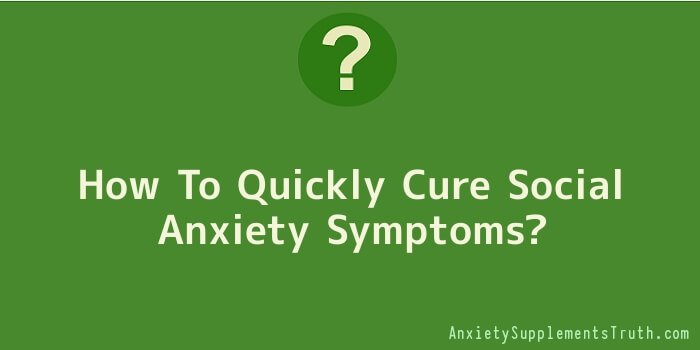
Social anxiety disorder happens when you are interacting with people in a social situation and you get a little too self-conscious and start to become anxious. Consequently, you experience a lot of distressing emotions as you are convinced that those around you are passing judgement on you.
Social anxiety symptoms will occur under these circumstances:
- You are introduced to someone new,
- Someone publicly pokes fun at you,
- You are doing something and you know someone is watching you,
- You are in the limelight for rather too long,
- You meet somebody who is in an important position, or
- You take part in some activity to ‘break the ice’ and this means you have to speak.
This list covers most situations covering social disorder, but it is not a comprehensive catalogue.
Nearly all of the situations described will cause physical symptoms to appear. You might start to perspire copiously, or be aware your heart is hammering furiously in your ribcage and so forth. Due to these unwanted reactions, you will probably alter your behaviour to keep yourself ‘safe’ and you may do some of the following:
- Talking softly so you cannot be heard,
- Saying something faster than normal so you can stop talking as soon as possible,
- Trying to avoid giving an opinion which contradicts that of another person,
- Not making eye contact for any length of time, or not at all.
There is a range of treatments available to help counter social anxiety symptoms. These include various medications to ease the symptoms, and forms of psychotherapy. Although the medications will help ease your symptoms, they do not target the root cause and so you need to look to other types of treatments to cure the problem.
The best form of psychotherapy is cognitive-behavioural therapy (CBT). Research has shown CBT to be highly effective where sufferers of social anxiety are concerned. Many people have cured their social anxiety symptoms trough the use of CBT.
If you are plagued by a social anxiety disorder, there are a number of self-help treatments you can try. Some of these involve you deliberately putting yourself in a situation that brings on your social anxiety symptoms. Obviously, you have to be careful here and moderation is the key.
One technique involves you monitoring your thoughts and feelings while you are in a distressing situation. Consider the scenario where you are introduced to someone new. You may automatically think things like ‘My voice will sound squeaky and then I’ll be embarrassed’ or ‘I am bound to say something stupid and make a fool of myself’.
Here’s what to do. Stop these thoughts in their tracks. Tell them they have no place in your life. Take deep, slow, regular breaths. Then replace those thoughts with something like ‘I have a warm friendly interesting voice’ and ‘I will show this person I am interested in them and they will be interested in me’. Importantly, you must visualise these things happening too. Repeated often enough, this tricks the brain into accepting this is the new you. Soon it will be and your social anxiety symptoms will be history.
